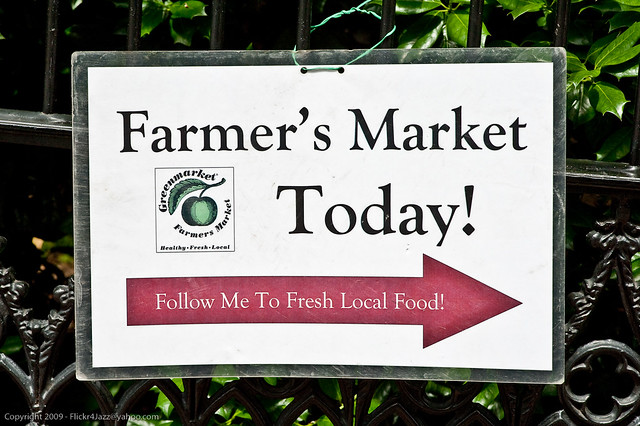
Farmers’ Market Near Battery Park
CC image courtesy of Jazz Guy on Flickr
Field trips, complex or simple, connect students with their local food and agriculture system in tangible, exciting ways. Possible venues include local farms, processing facilities, farmers’ markets, grocery stores, community or school gardens, or even school cafeteria kitchens. “Micro” trips to a school cafeteria or garden or to nearby neighborhood stores or markets are practical when budget and time constraints preclude longer trips. Student learning on field trips can reinforce classroom learning in multiple areas, including science, math, health and social studies, and deepen understanding ofconnections among agriculture, diet, health and community well-being.
An alternative approach is to invite a farmer or chef to visit the school and talk with students about his/her involvement with the local food system.
Consider the following ideas and resources in planning Farm to School field trips.
Initial Planning
It’s helpful to consider some basic questions:
- What do you hope to accomplish with a field trip, and how will the trip support learning in classroom subject areas?
- What are possible places to visit in your area? Talk with and explore opportunities for field trips with school teachers, and administrators, as well as parents and community members and Cornell Cooperative Extension professionals who all may know of potential places to visit.
- What is your budget for a field trip?
- What do you need to do to prepare students for a field trip? What do they need to know ahead of time?
Farm Visits
- Making the Farm Connection: A Guide to Field Trips for Farmers by the Community Alliance with Family Farmers (CAFF) will be helpful for farmers interested in having students visit their farms.
- The first part of The Hayride: A Resource for Educational Farm Field Trips by the Appalachian Sustainable Agriculture Project will be helpful for teachers and others who are planning to take students to visit a farm.
- A Farm Field Trip Guide: A Hands On Curriculum for Farm-based Education by Green Mountain Farm-to-School provides trip tips for farmers and teachers, lesson plans appropriate for different kinds of farms, and forms to use in planning a trip.
Farmers’ Market Visits
To find farmers’ markets in your county see the New York State Department of Agriculture and Markets farmers’ markets directory.
Grocery Store Visits
Many grocery stores welcome school visits; some stores have standardized visiting programs for certain grade levels.
